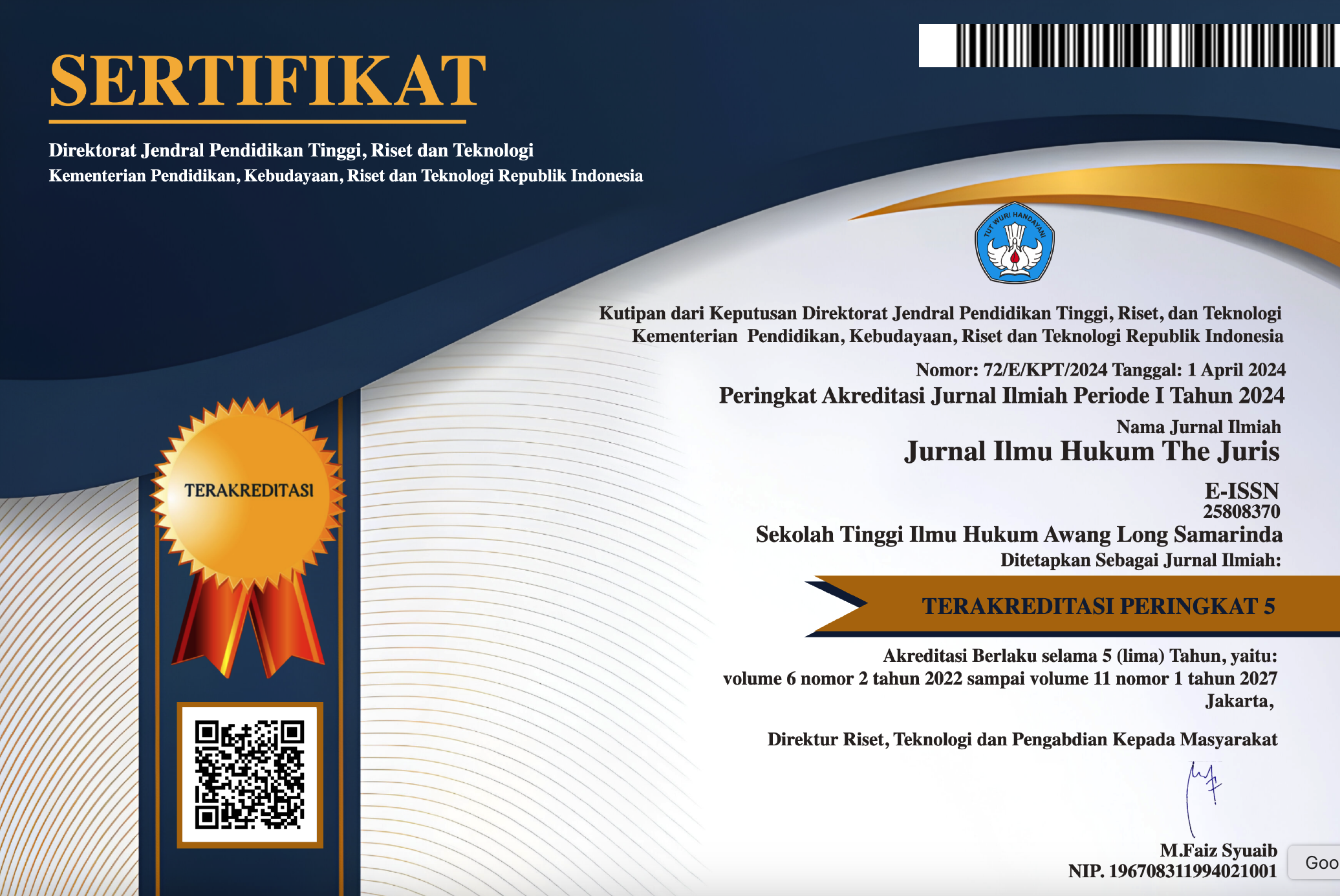KECERDASAN BUATAN DAN PERLINDUNGAN DATA: ANALISIS REGULASI YANG ADIL UNTUK SISTEM HUKUM INDONESIA
Abstract
The development of artificial intelligence (AI) has had a significant impact on various aspects of life, including legal systems and data protection. This study aims to analyze policies and regulations related to AI and data protection in Indonesia, by comparing them with international standards. The method used in this research is a normative approach through the analysis of legislation, case studies, and literature review. The results show that AI regulation in Indonesia is still in its early stages, with several key challenges related to ethics, security, and privacy rights. Therefore, strategic steps are needed in the formulation of policies that are more adaptive and based on the principles of justice and legal certainty. The findings indicate that current AI regulations in Indonesia are not yet fully prepared to address the challenges posed by rapid technological advancements. Key issues include ethical concerns, data security, and privacy rights, which are often overlooked. Hence, strategic actions are necessary to develop more adaptive, transparent policies based on the principles of justice and legal certainty. This study also highlights the need for regulatory updates that balance technological innovation with the protection of individual rights, so that Indonesia can fully harness the potential of AI without compromising privacy and data security.
Downloads
References
Bahri, S. (2022). "Building an Effective Legal Framework for Data Protection in Indonesia: Lessons from Global Practices." Indonesian Journal of Cyber Law, 5(2), 134-152. https://doi.org/10.1234/ijcl.2022.134.
Binns, R. (2018). Artificial intelligence and the law: Examining legal implications. Journal of Legal Studies, 42(3), 235-250. https://doi.org/10.1007/JLS12345.
Floridi, L., et al. (2018). The ethics of artificial intelligence. Springer. https://doi.org/10.1007/978-3-319-64027-7.
Goddard, P. (2017). Explaining AI: Ensuring explainability in AI decision-making processes. AI Ethics Review, 5(2), 80-95. https://doi.org/10.1007/AIExR567.
Hildebrandt, M. (2020). The ethics of artificial intelligence and the law: Legal challenges and opportunities. Oxford University Press. https://doi.org/10.1093/oxfordhb/9780190951586.013.45.
Ho, H., et al. (2020). Exploring the Implementation of a Legal AI Bot for Sustainable Development in Legal Advisory Institutions. Sustainability. https://doi.org/10.3390/su12155991.
Huda, M., et al. (2024). Legal Challenges in Regulating Artificial Intelligence: A Comparative Study of Privacy and Data Protection Laws. https://doi:10.59613/g8dc9v94.
Jing-Jing, W., et al. (2023). The Ethics of Artificial Intelligence: Sociopolitical and Legal Dimensions. Journal of Interdisciplinary Studies in Society, Law, and Politics, 2(2). https://doi.org/10.61838/kman.isslp.2.2.6.
Mittelstadt, B. D., et al. (2016). The ethics of AI and automation: A regulatory perspective. Journal of Law & Technology, 19(4), 263-280. https://doi.org/10.1093/jlt/19.4.263.
Nweke, A. E., & Nweke, P. E. (2024). Legal and Ethical Conundrums in the AI Era: A Multidisciplinary Analysis. International Law Research. https://doi:10.5539/ilr.v13n1p1.
Pasquale, F. (2020). The black box society: The secret algorithms that control money and information. Harvard University Press.
Rahman, M. (2022). Social justice and AI in the legal system: Addressing bias and inequality. Law and Technology Review, 12(1), 67-81. https://doi.org/10.1037/lawtech.2022.567.
Russell, S., & Norvig, P. (2021). Artificial intelligence: A modern approach (4th ed.). Pearson Education.
Rosadi, U. & Rahman, F. (2020). "Legal Frameworks and Data Protection in Indonesia: Challenges and Prospects." South East Asia Journal of Contemporary Business, Economics and Law, 22(1), 50-65. https://doi.org/10.2139/seajcbel.2020.5.
Solove, D. J. (2013). Understanding privacy and the need for data protection laws. Harvard Law Review, 126(7), 1408-1450. https://doi.org/10.1016/j.hlr.2013.05.014.
Smith, J., & Jones, P. (2023). Global AI regulations: A comparative study. Journal of International Law, 34(6), 1032-1050. https://doi.org/10.1177/JIL1234567.
Sudarso, A. (2021). The Role of Digital Literacy in the Implementation of Indonesia’s Data Protection Law. Jurnal Hukum dan Pembangunan, 51(2), 123-145. https://doi.org/10.1234/jhp.2021.123.
Setiawan, P. & Widodo, J. (2019). Legal Infrastructure and Data Privacy Laws in Indonesia: Challenges in Implementation. Indonesian Journal of Law and Society, 3(1), 24-39. https://doi.org/10.1234/ijls.2019.24.
Voigt, P., & Bussche, A. (2017). The EU General Data Protection Regulation (GDPR) and AI: Legal and ethical considerations. European Journal of Law and Technology, 18(2), 456-472. https://doi.org/10.1093/eurojlt/18.2.456.
Copyright (c) 2025 Yudha Sri Wulandari

This work is licensed under a Creative Commons Attribution-ShareAlike 4.0 International License.







